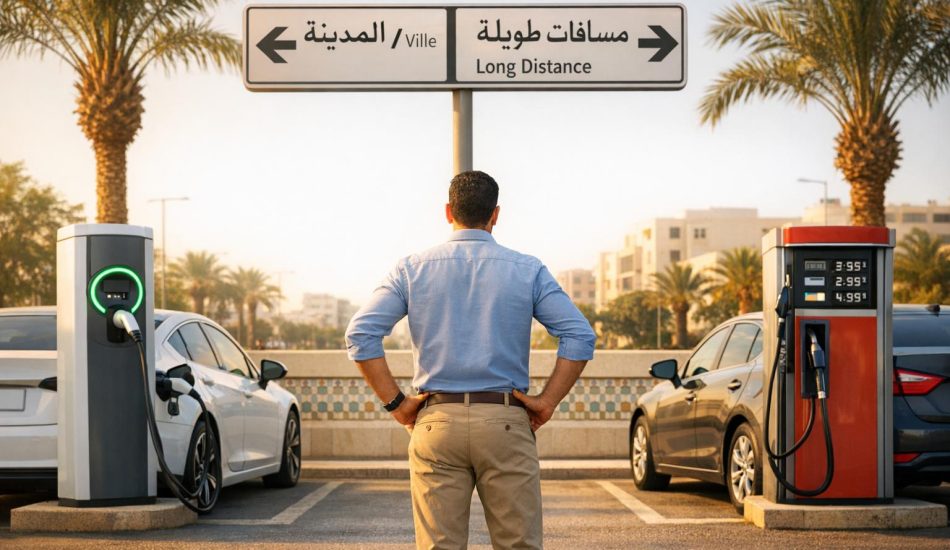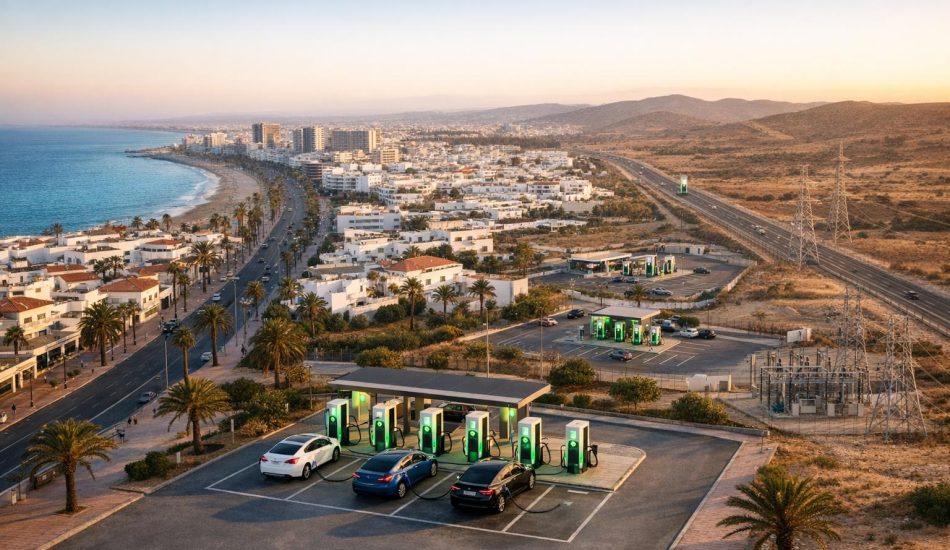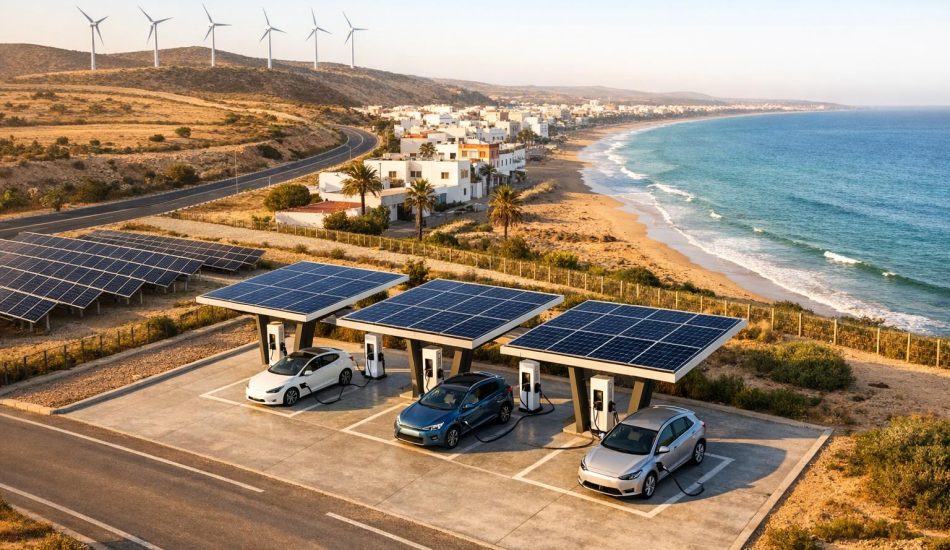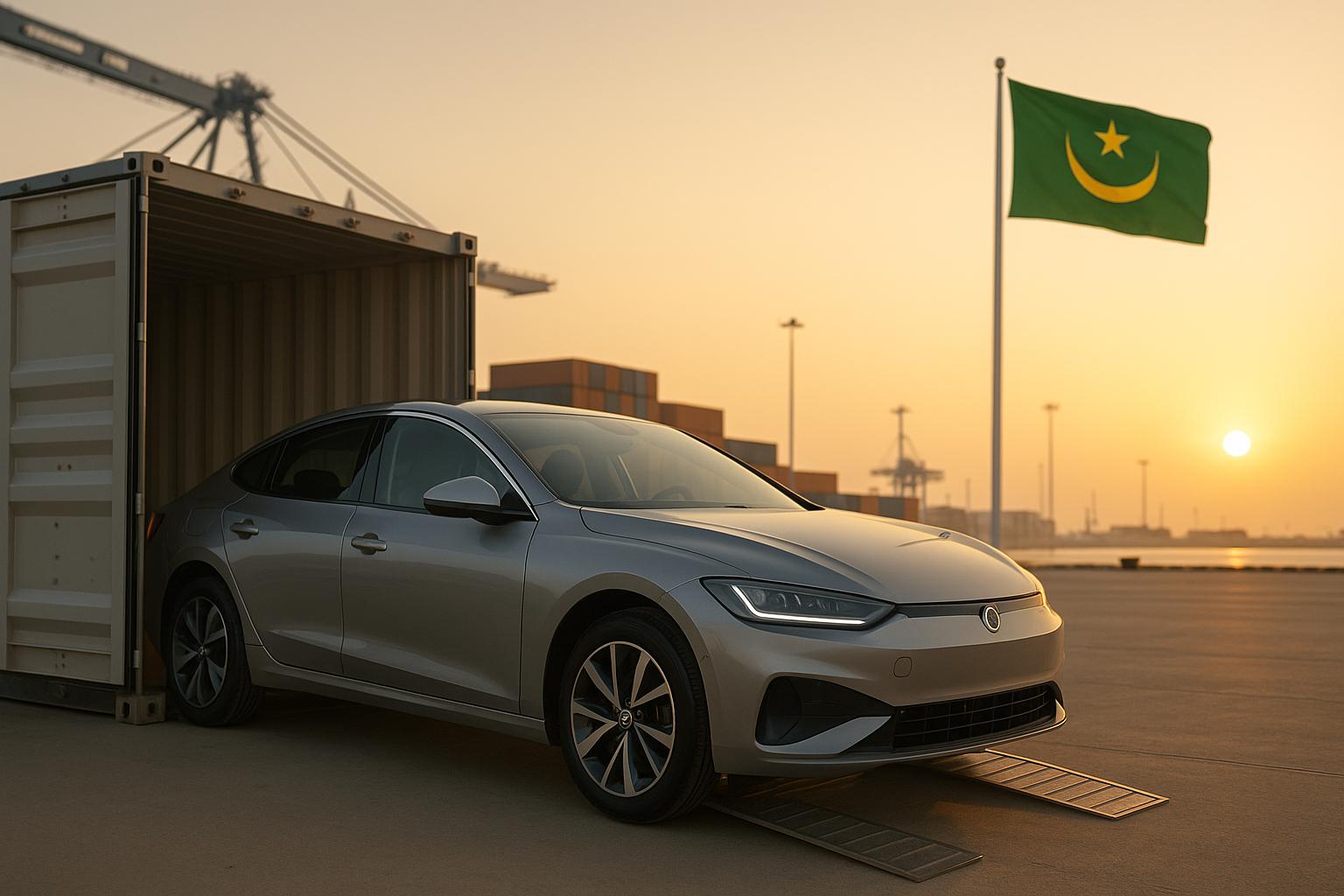
Mauritania’s 2025 EV import policy offers full tax exemptions and reduced duties for electric vehicles (EVs), making them a cost-effective alternative to gas-powered cars. The government aims to promote cleaner transportation and attract investment by lowering costs for importers and buyers. Here’s what you need to know:
- Tax Benefits: EVs are exempt from VAT (16%) and customs duties, unlike gas vehicles, which incur up to 31% in combined taxes.
- Vehicle Age Limit: Only vehicles manufactured in 2017 or later are allowed.
- Import Process: Requires registration, customs clearance, and documentation like invoices, inspection certificates, and safety compliance records.
- Battery Regulations: EV batteries must meet international safety standards and include proper labeling and inspection certificates.
If you’re importing, platforms like EV24.africa simplify the process by handling logistics, compliance, and customs clearance, ensuring smooth delivery to Mauritania.
| Comparison | Electric Vehicle (EV) | Gas Vehicle |
|---|---|---|
| Import Duty | $0 | 10% ($2,500 for a $25,000 car) |
| VAT | $0 | 21% ($5,250 for a $25,000 car) |
| Local Fees | $1,500 | $1,500 |
| Total Taxes | $1,500 | $9,250 |
With these savings, EVs are now a financially appealing and environmentally friendly option for Mauritanians.
Taxes and Incentives for Electric Vehicles
Mauritania has introduced a tax framework for electric vehicles (EVs) that includes exemptions and reduced duties, offering considerable savings compared to traditional gas-powered cars.
Import Taxes and VAT Rates
Mauritania provides full exemptions from VAT and customs duties for 100% electric vehicles, making them a cost-effective choice for importers and buyers. For context, the standard VAT rate in the country is 16% for most imported goods. In contrast, importing a conventional gas-powered vehicle incurs a 10% import duty, a 21% VAT, and about $1,500 in local fees upon arrival. Shipping costs from Spain range between $1,147 and $1,692, with Roll-on/Roll-off (RORO) shipping being the most budget-friendly option.
These reduced tax rates, along with other incentives, make EVs a financially attractive option in Mauritania.
Government Incentives for EVs
The Ministry of the Economy in Mauritania has introduced policies that waive internal taxes and progressively reduce import duties for traditional, hybrid, and electric vehicles. Fully electric vehicles enjoy complete tax exemptions, making them the most affordable option. These policies, combined with the already favorable tax rates, position EVs as the best choice for those looking to import vehicles into the country.
Cost Comparison: EVs vs. Gas Vehicles
The financial advantage of importing EVs becomes clear when comparing their total costs to those of gas-powered vehicles. For instance, on a $25,000 vehicle, tax savings can exceed $9,000 when opting for an electric model instead of a traditional one.
| Vehicle Type | Import Duty | VAT | Total Taxes | Local Charges | Total Extra Costs |
|---|---|---|---|---|---|
| Electric Vehicle | $0 (Exempt) | $0 (Exempt) | $0 | $1,500 | $1,500 |
| Gas Vehicle | $2,500 (10%) | $5,250 (21%) | $7,750 | $1,500 | $9,250 |
| Savings with EV | $2,500 | $5,250 | $7,750 | $0 | $7,750 |
For businesses importing multiple vehicles, these savings can significantly reduce costs, allowing for more competitive pricing and better profit margins. While hybrid vehicles also benefit from reduced duties, fully electric vehicles remain the most cost-efficient option for importers in Mauritania.
Step-by-Step EV Import Process
Bringing an electric vehicle (EV) into Mauritania involves several crucial steps, from gathering the right paperwork to completing registration. Following these steps can help you navigate the process smoothly and avoid unnecessary setbacks at customs.
Import Process Steps
First, register with the Central Importers Register and obtain a tax registration number (NIF) from Customs. This is mandatory if your annual imports exceed $86,000 or if your capital surpasses $14,000. Next, hire a licensed customs clearing agent to manage your import declaration through the ASYCUDA WORLD system.
Submit a detailed declaration for your EV, along with all required documents. Customs officials will review your submission and may conduct a physical inspection of the vehicle. Once the inspection is complete and you’ve paid the necessary customs duties and taxes, proceed with local vehicle registration and secure insurance coverage to legally operate your EV on Mauritanian roads.
To avoid delays, ensure all required documents are prepared in advance.
Required Documents
Every imported item must be accompanied by a detailed declaration and relevant commercial documents, such as proof of purchase and transport records. Depending on the type of import, you may also need sanitary or phytosanitary certificates.
Key documents include:
- A commercial invoice detailing buyer and seller information, vehicle specifications, shipping method, delivery terms, and payment conditions.
- A bill of lading or a certificate of origin.
- An SGS inspection certificate.
If importing from the U.S., you’ll also need the original state title, bill of sale, detailed vehicle specifications, and shipper/consignee details. Additionally, include a pre-shipment inspection certificate. For large transactions, use irrevocable, confirmed letters of credit or direct bank transfers.
Working with experienced exporters who understand African import requirements can help ensure your documentation is accurate and complete. Once your paperwork is ready, confirm that the vehicle complies with all safety and regulatory standards before shipping.
Safety and Compliance Rules
Electric vehicles must adhere to specific safety and compliance standards, particularly regarding battery systems and hazardous material classifications. The shipper must book transportation under International Maritime Organization (IMO) regulations for hazardous materials.
Before shipping, confirm that the battery system is intact, and ensure the vehicle has a visible VIN and propulsion type label. The shipper must also provide a Material Safety Data Sheet (MSDS) for the car battery to prove compliance with hazardous material rules. Notify both the transporter and Customs about your import plans ahead of time.
Some shipping companies may have restrictions on moving electric or hybrid vehicles internationally due to safety concerns, so it’s crucial to verify their policies before finalizing arrangements. Clearly state whether the vehicle is new or used, as this can influence handling procedures.
Lastly, be aware of Mauritania’s import restrictions. Prohibited items include animals, goods from contaminated regions, narcotics, unauthorized arms and ammunition, pornographic materials, counterfeit products, and plastic bags. While these rules typically don’t apply to EV imports, compliance with all regulations is essential to avoid issues during customs clearance.
Compliance Rules and Restrictions
Navigating Mauritania’s compliance requirements is a critical step for anyone looking to import electric vehicles (EVs) into the country. These regulations are in place to ensure safety, quality, and adherence to local standards.
Vehicle Age and Condition Limits
Mauritania has strict rules regarding the age of imported vehicles to promote road safety and reduce environmental risks. Vehicles older than eight years are not allowed, including electric cars. This calculation is based on the original manufacturing date. For example, if you’re planning to import an EV in 2025, it must have been manufactured in 2017 or later.
Additionally, Mauritania permits the importation of left-hand drive vehicles, which is particularly favorable for exporters from the United States. Before shipping, all used vehicles must undergo a pre-shipment inspection in the country of origin. A certificate verifying the inspection must be included in the import documentation.
Once the vehicle meets the age and condition requirements, it must also comply with stringent regulations regarding batteries and hazardous materials.
Battery and Hazardous Materials Rules
The import process for EV batteries involves additional oversight due to their classification as hazardous materials. Lithium batteries, in particular, require careful handling and must meet international safety standards. Importers are responsible for ensuring pre-shipment inspections and quality checks for both the EV and its battery system.
A certificate of inspection must accompany the shipment, confirming that the battery system is secure, properly labeled, and free from any leakage. Pre-shipment inspections, such as those conducted by SGS, verify these conditions to ensure safety during transport and upon arrival in Mauritania. This thorough process minimizes risks associated with battery handling and storage.
Documentation and Inspection Checklist
Accurate documentation and thorough inspections are essential to ensure compliance with Mauritania’s import regulations. Regular importers must register with the Central Importers Register and submit a detailed declaration for all goods. Additionally, a data-processing fee of 3,000 old ouguiyas (approximately US$8.60) is charged for each vehicle processed through customs.
| Document/Inspection | Purpose | Key Requirements |
|---|---|---|
| Commercial Invoice | Confirms purchase details and vehicle specifications | Must include buyer/seller info, vehicle description, price, delivery terms, and payment conditions |
| SGS Certificate of Inspection | Verifies vehicle condition and compliance | Required for all imported vehicles, focusing on safety and quality |
| Detailed Declaration | Official customs filing | Covers all commercial and transport documents |
| Phytosanitary Certificate | For organic packaging materials | Required if plant-based materials like wooden crates are used |
All labels and documentation must be in French and/or Arabic to meet Mauritania’s language requirements. This includes labels on the vehicle and its packaging – English-only labels can lead to delays during customs inspections.
Customs officials pay close attention to the safety and cleanliness of imported vehicles. They inspect battery systems, electrical components, and the overall condition of the EV. If organic materials like wooden crates or natural fiber padding are used in packaging, a phytosanitary certificate is mandatory. Failing to provide this documentation could result in significant delays.
sbb-itb-99e19e3
How EV24.africa Makes EV Imports Easier
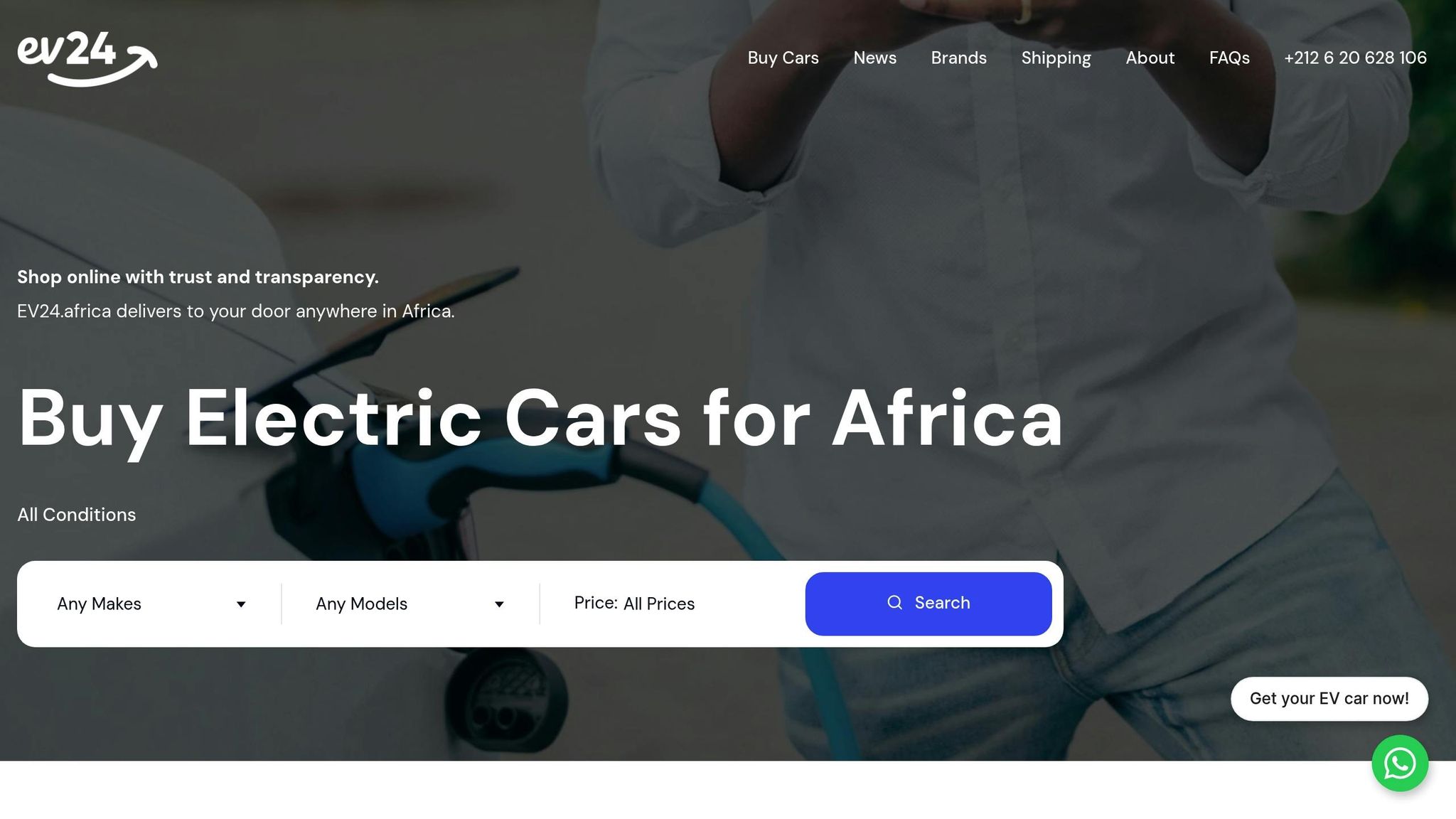
Bringing electric vehicles (EVs) into Mauritania can be a daunting process, with layers of regulations, paperwork, and logistical challenges. EV24.africa simplifies this journey by managing every step of the import process, making it more accessible for buyers.
EV24.africa Services Overview
EV24.africa functions as a dedicated marketplace linking Mauritanian buyers to electric vehicles from around the world. The platform provides access to popular EV brands such as Tesla, BYD, Volkswagen, XPeng, and Hyundai, sourcing vehicles from regions including Europe, Asia (China included), North America, and Japan. With a delivery network spanning all 54 African nations, the company operates with a team of over 200 professionals across five African countries and maintains partnerships in more than 40 others. For Mauritania, EV24.africa ensures smooth delivery through the Port of Nouakchott.
One of the standout features of EV24.africa is its transparent pricing. Customers receive detailed quotes upfront, covering all fees, taxes, and shipping costs. The platform also offers flexible financing options, making EV ownership more attainable for a wider audience.
Simplifying the Import Process
EV24.africa’s extensive service network takes the complexity out of importing EVs by handling every detail. The platform operates in accordance with international trade terms like CIF (Cost, Insurance & Freight) and DAP (Delivered at Place), ensuring all processes align with Mauritania’s regulations. Specialized documentation, such as Material Safety Data Sheets for EV batteries, is also taken care of.
To cater to different needs, EV24.africa provides two main shipping options, guiding customers on the best choice for their situation:
| Shipping Method | Ideal For | Key Benefits | Considerations |
|---|---|---|---|
| RoRo (Roll-on/Roll-off) | Operational vehicles, cost-conscious buyers | Lower cost, quicker loading, frequent departures | Limited protection; vehicle must be operational |
| Container Shipping | Non-operational vehicles, maximum security | Fully enclosed protection; ships 3–4 cars per 40ft container | Higher cost; less frequent departures |
These tailored shipping options help minimize delays and manage costs through efficient logistics. Customers also benefit from real-time tracking and updates throughout the shipping process, making it easier to plan for customs clearance and final delivery.
Why Choose EV24.africa?
EV24.africa offers more than just shipping; it provides end-to-end support, including customs clearance, vehicle registration, and handling import taxes. By leveraging bulk shipping – such as fitting up to four cars in a 40ft container – the platform significantly reduces per-vehicle shipping costs.
The service is also flexible, offering delivery options ranging from port-to-port to door-to-door. This adaptability is particularly valuable in Mauritania, where transportation infrastructure can vary widely between urban and rural areas.
Technical compliance is another area where EV24.africa excels. The platform ensures vehicles meet Mauritanian standards, verifying proper VIN labels on windshields to indicate propulsion type and inspecting battery systems for damage or leaks before shipment. These checks help avoid costly delays or rejections at customs.
For individuals and businesses aiming to import EVs into Mauritania, EV24.africa provides detailed quotes that break down costs and timelines. This transparency allows customers to make informed decisions while supporting Mauritania’s push toward sustainable transportation solutions.
Conclusion
Mauritania’s 2025 electric vehicle (EV) import policy marks a bold step toward advancing cleaner transportation within the country. By offering full tax exemptions on EVs, the government has made these vehicles significantly more accessible for individuals and businesses looking to upgrade their fleets. However, the import process comes with its own set of challenges, requiring strict compliance with documentation requirements and battery safety regulations.
Navigating this process can be overwhelming, especially for first-time importers. The intricate tax structures and customs procedures demand professional expertise. This is where platforms like EV24.africa come into play. By handling every aspect of the import process – from sourcing vehicles to ensuring delivery – they simplify the experience. Their transparent pricing and streamlined approach make it easier to meet Mauritania’s regulatory standards while reducing the administrative hassle.
For residents and businesses in Mauritania, the combination of government incentives and professional support creates a solid opportunity to embrace EV technology. Not only does this reduce the financial barrier to entry, but it also ensures compliance with all necessary regulations, making the transition to electric vehicles smoother and more accessible.
With the global EV market rapidly expanding, Mauritania’s forward-thinking policy, paired with the expertise offered by services like EV24.africa, paves the way for a greener and more sustainable transportation future in the region.
FAQs
What are the steps and required documents for importing an electric vehicle into Mauritania in 2025?
To import an electric vehicle (EV) into Mauritania in 2025, here’s what you’ll need to do:
- Prepare the necessary documents: Collect key paperwork like the purchase invoice (showing the vehicle’s details and price), an export certificate from the country of origin, a Bill of Lading, a Certificate of Conformity (CoC), and proof of battery certification.
- Submit all paperwork: Hand over the required documents, including the commercial invoice, shipping bill (original or airway/seaway bill), and certificate of origin, to the appropriate authorities.
- Pay the import taxes: Be ready to cover all applicable taxes, including a 16% VAT, as part of the customs process.
- Complete customs clearance and registration: After paying taxes and verifying documents, finish the customs process and register the vehicle for legal use in Mauritania.
By staying organized and following these steps, you can make the import process smoother and avoid unnecessary setbacks.
What tax benefits and incentives does Mauritania offer for electric vehicles compared to hybrids or gas-powered cars?
Mauritania offers complete VAT exemptions and lower import duties on electric vehicles, making them much cheaper to bring into the country than hybrids or gas-powered cars. On the other hand, hybrids and traditional gas vehicles face standard tariffs and taxes, which drive up their total cost.
These measures reflect Mauritania’s push toward cleaner energy solutions and minimizing environmental impact, positioning EVs as a more appealing choice for both individuals and businesses.
What safety and compliance standards do electric vehicle batteries need to meet for import into Mauritania?
Electric vehicle batteries brought into Mauritania are required to meet international safety and technical standards. This means they must be free from any damage, leaks, or defects, and they need to comply with regulations for hazardous materials. Importers often need to provide a Material Safety Data Sheet (MSDS) to ensure the batteries are handled and transported safely.
These regulations are in place to align with global practices, ensuring the safe importation and use of EV batteries within the country.


